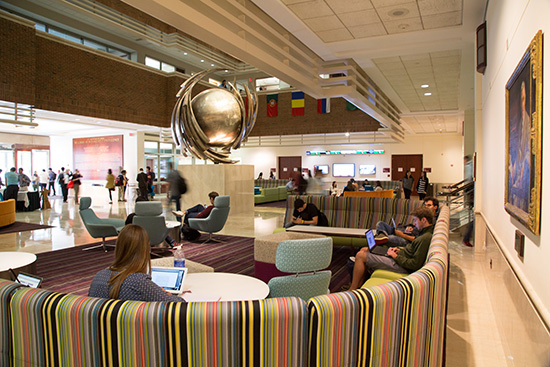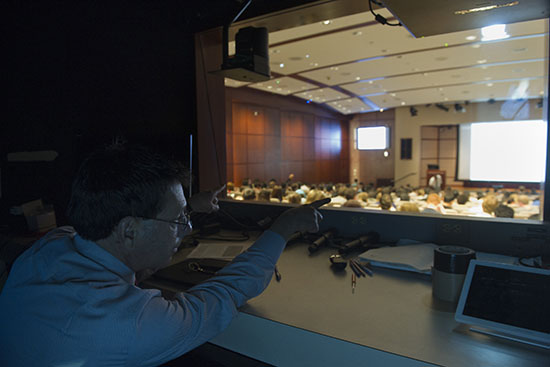Updated Technology Enhances New Curricula at SMG
Summer construction links high-tech classrooms to coursework

The SMG lobby now has a ticker display with a direct feed of stock market numbers. Photo by Adriane Dean
Case studies are a thing of the past in Lloyd Baird’s undergraduate course Meeting the Leadership Challenge. Why read about a business dilemma, he says, when students can help solve a real one?
Baird, a School of Management professor and chair of organizational behavior, found three corporations that agreed to include small groups of SMG students in their product development process. Every few weeks, the teams meet via Skype to solve problems, thanks to technology now available in the school’s newly renovated classrooms. So far, students’ suggestions rescued at least one business from going belly up.
Baird says that one group of executives told his students, “You basically saved us. We were heading down the wrong path.”
That’s real experience, in real time, and it’s all part of the vision Kenneth Freeman, Allen Questrom Professor and Dean of SMG, has developed since his arrival at BU three years ago. He and his staff have revamped the undergraduate and full-time graduate MBA curricula so courses reflect what Freeman sees as SMG’s core values: a global perspective, ethical leadership, and social responsibility. Classes will also regularly explore issues facing the world’s fastest growing and transformative business sectors, including health and life sciences, digital technology, and social enterprise and sustainability.
Freeman built his vision on values established 100 years ago by SMG’s founding dean, Everett Lord, who once said that business is built on the virtues of honesty, truthfulness, integrity, and reputation.

“In today’s world, we see a steady stream of business leaders not following the intent of these powerful words,” says Freeman, the former CEO of Quest Diagnostics. “Our curriculum places an essential, critical focus on ethics from the start.” And while he says that the language of business is English, “how business is conducted around the world varies greatly. We prepare our students to be aware of, and appreciate, cultural differences—an essential element for success in a constantly shrinking world.”
One way to accomplish that goal is to bring the latest interactive technology into the classroom, which is what SMG did during an extensive renovation this summer. Cameras in the first floor auditorium live-stream lectures to neighboring classrooms, state-of-the-art microphones capture students’ questions clearly, and videoconferencing technology allows as many as 24 business professionals at a time to “visit” a lecture. Innovation classrooms enable students to work on team projects using computer monitors and interact with the professor in real time. Professors use iPads like mobile chalkboards to scribble notes and to project lecture slides onto an Apple TV and flanking LCD screens. And lectures can be recorded on video to help students review for exams or catch up on missed classes.
“Our new technology is leading the path for business schools globally, empowering SMG faculty to transform classroom discussions and how our students engage with real-world situations and content,” Freeman says. “We can now interact globally, in real time, with executives, students, and schools from around the world.”
Baird is among the early adopters of the technology, and in coming months plans to have at least two fellows from the University’s Humphrey Fellowship Program, one in India and another in Nepal, videoconference with his class to discuss leadership from a global perspective. BU is one of 18 US universities that host the Humphrey program, a Fulbright exchange activity funded by Congress since 1978.

While some professors enthusiastically embrace the technology, others are more reluctant. Greg DeFronzo, SMG’s director of information technology services, says he and his team are working with faculty to adapt their curriculum to the high-tech classrooms, sometimes recruiting other faculty to lead training sessions. “The whole goal is not to get in the way of the pedagogy,” he says.
SMG undergraduate and graduate students are already experiencing the new curricula structure, says Deborah Marlino, SMG associate dean of academic affairs and student programs. On the undergraduate side, coursework is now divided into three primary elements. The pre-core exposes students to social issues, the humanities, and the wider liberal arts, while introducing them to traditional management disciplines and global and ethical perspectives on business. The cross-disciplinary core allows them to apply what they’ve learned in team projects. And the post-core provides an opportunity to explore more advanced management courses and their particular interests through electives.
The full-time MBA program was converted over the summer to a series of modular classes, which move students from business organization, through function, and on to strategy and “the big picture,” Marlino says. As part of their first spring semester, graduate students will split into teams to tackle real, large-scale projects provided by IBM before moving into their summer internships. They will return in the fall of their second year to one required course and a series of electives designed to help them hone their specialties.
Each step of the way, she says, SMG students will be encouraged to think about their careers, learn to work in teams, and perfect their verbal and written communication skills.
“We realized we had a very solid MBA curriculum,” Marlino says, “but we weren’t addressing to the extent we wanted to…what will happen 10, 20, 30 years down the line in business management.” She thinks the new curriculum hits that mark.
Comments & Discussion
Boston University moderates comments to facilitate an informed, substantive, civil conversation. Abusive, profane, self-promotional, misleading, incoherent or off-topic comments will be rejected. Moderators are staffed during regular business hours (EST) and can only accept comments written in English. Statistics or facts must include a citation or a link to the citation.